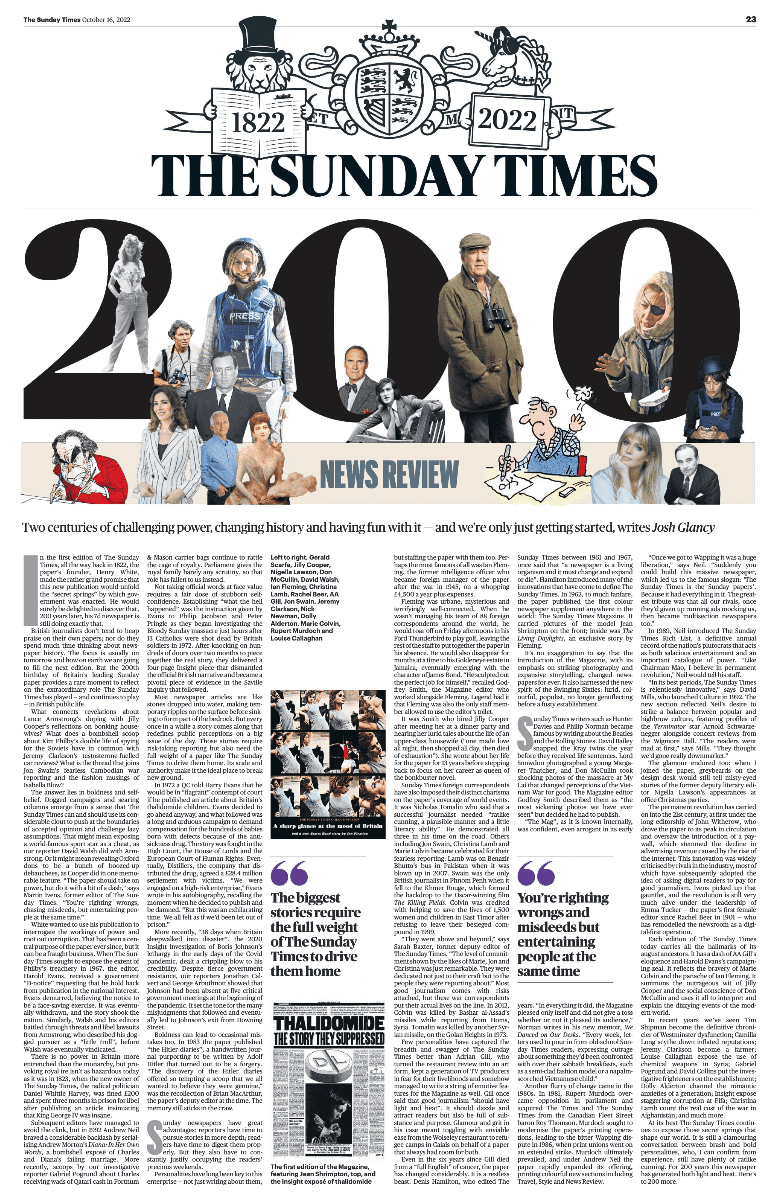The News Corp British flagship The Sunday Times celebrated a special milestone over the weekend. However political turmoil in the UK meant it didn’t find a spot on the front page.

An editorial in a special edition of The Sunday Times started with the following:
We are about to celebrate an important birthday: The Sunday Times is turning 200.
The paper was founded in 1822 by Henry White, who set out to expose the “secret springs” by which government was enacted. Over the past two centuries we have done that and more, revealing Kim Philby’s Soviet treachery, the thalidomide scandal, the truth of Princess Diana’s dysfunctional relationship with Prince Charles, Lance Armstrong’s doping and more recently the government’s chaotic handling of the early days of the pandemic.
The freedom to pursue ground-breaking journalism has never been more important. Around the world, from Brazil to Beijing, autocratic regimes constrain the right of self-expression. The rise of social media poses profound challenges to established media and to democracy itself. Linked to social media is the increasing tyranny of the culture wars. It now takes bravery to publish contentious views.

Also in the special edition:
The Sunday Times at 200: challenging power, changing history and having fun with it
In the first edition of The Sunday Times, all the way back in 1822, the paper’s founder, Henry White, made the rather grand promise that this new publication would unfold the “secret springs” by which government was enacted. He would surely be delighted to discover that, 200 years later, his 7d newspaper is still doing exactly that.
British journalists don’t tend to heap praise on their own papers; nor do they spend much time thinking about newspaper history. The focus is usually on tomorrow and how on earth we are going to fill the next edition. But the 200th birthday of Britain’s leading Sunday paper provides a rare moment to reflect on the extraordinary role The Sunday Times has played — and continues to play — in British public life.
In 1981, Rupert Murdoch overcame opposition in parliament and acquired The Times and The Sunday Times from the Canadian Fleet Street baron Roy Thomson. Murdoch sought to modernise the paper’s printing operations, leading to the bitter Wapping dispute in 1986, when print unions went on an extended strike. Murdoch ultimately prevailed, and under Andrew Neil the paper rapidly expanded its offering, printing colourful new sections including Travel, Style and News Review.

First Sunday Times female proprietor had Midas touch from Australian goldfields
Alice Cornwell made a fortune as a goldminer in Australia then followed her lover back to London, bought The Sunday Times and installed him as the editor, reports Lizzie Broadbent in The Sunday Times:
In January 16, 1888, Oscar Wilde wrote a letter to the newly appointed editor of The Sunday Times, Phil Robinson. He was pitching a short story by up-and-coming dramatist C Haddon Chambers, “a very clever feuilleton called The Little Gold Nugget, which I think would suit The Sunday Times”. Innocent on the surface, but some suggest mischief from the great writer, who knew that two months earlier the paper had been bought by Alice Cornwell, a 36-year-old gold miner — and Phil’s unofficial partner.
Born in West Ham, east London, in 1852, Alice emigrated with her parents to Melbourne when she was five. Australia and New Zealand were hot with gold fever and her father, George, who ran construction firms, was a born gambler.
Top image: Clockwise from top left – Jilly Cooper, Nick Newman, Marie Colvin, Dolly Alderton, Rupert Murdoch, Louise Callaghan, Jon Swain, Don McCullin, Christina Lamb, Gerald Scarfe, AA Gill, Jeremy Clarkson, Nigella Lawson and David Walsh
See also: Murdoch-controlled News Corp and Fox Corp investigate possibility of a merger
